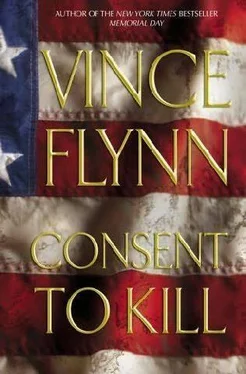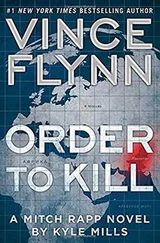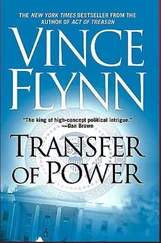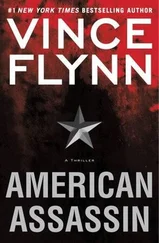"What do you think?" the sheriff asked McMahon.
One of the men who had come up with the deputy looked at McMahon and shook his head. McMahon was not surprised that the man did not want cameras around. He looked over at the smoking house and turned to the deputy. "Tell them we're checking for gas leaks. It'll be about another hour."
The sheriff nodded his consent and the deputy left.
"Sheriff," said McMahon, "if you'll excuse me for a minute, I need to talk to these gentlemen."
"I'll go make sure the TV crew doesn't weasel their way in here."
"Good idea." When the sheriff was gone, McMahon looked at the two men. He knew the blond-haired man, but had never met the other guy. He could tell a great deal, though, by taking a quick inventory of him. He was wearing jeans, hiking boots, and a black Mountain Hard-wear fleece jacket. He had a large black rubber dive watch on his right wrist, his hair was dark and shaggy, and although he was a good seventy-five pounds lighter than the FBI agent, McMahon had no doubt the little scrapper could kill him without breaking a sweat. The guy was Special Forces from head to toe.
All of this was easy to surmise since he already knew for a fact that the other man had indeed been Special Forces. McMahon turned his attention back to the taller of the two. "Scott Coleman," he said, "I was about to say you're the last person I expected to see, but now that I think about it I should have expected you."
"Irene called me." The former SEAL was all business. "She wanted us to take a look around."
McMahon thought about that for a second. He wasn't so sure he agreed with the director of the CIA. "Who's your friend?"
Coleman started to answer, and then McMahon put his hand out and cut him off. "Never mind," the agent said. "I don't want to know. Do I?"
Coleman shrugged. "It wasn't like I was going to give you his real name."
McMahon shook his head and turned toward the house. "You ever been here before?"
Coleman nodded.
"I suppose you and Mitch are pretty tight."
"Yeah." Coleman looked at the other man he'd come with and made a slight gesture with his head. "You know what to look for."
The man looked each way down the road, nodded, and was gone.
"They're saying it's a gas explosion."
McMahon nodded. "Propane."
"Who?"
"The sheriff and the fire chief."
"Can I talk to the fire chief?"
"Sure, follow me." They walked roughly halfway down the driveway and found the county fire chief nudging a piece of debris with his boot. The man had gotten rid of his jacket, but he was still wearing his heavy boots, helmet, and fire-resistant overalls. McMahon made a quick introduction, telling the chief Coleman's first name and nothing more.
The fire chief started by pointing back toward the left side of the charred house. "We found some traces of an accelerant over there where the garage used to be and near where the propane tank used to sit."
McMahon gave the fire chief a quick "See, I told you so" look and said, "So it isn't an accident after all."
"I wouldn't say that."
"I thought you said you found traces of an accelerant."
"I did, but it's not unusual to find traces like that in and around the garage. I see he has a couple of boats, it's a pretty big yard to mow…I'm sure he stored gas in the garage. He may have even had one of those gas caddies with a long hose. They're real popular around here. You save about fifty cents a gallon if you buy it at a gas station rather than filling up at the marinas."
Coleman nodded.
"A gas caddie?" asked McMahon.
"Yeah…they're a cross between a two-wheeler and big gas can." The chief gestured with his hands to show McMahon the approximate size. "They usually hold between twenty-five and fifty gallons. They're red, they have a hand pump, a hose, and a nozzle. You can wheel them around, but you'd never want to take it down stairs like the ones going down to the dock here. You'd just walk the hose down, leave the caddie up at the top, and fill the boats."
McMahon got the picture. "Can you tell if the accelerant was gas?"
"Pretty sure."
"How sure?"
"Ninety percent," answered the chief.
"Can you tell how much was used?"
"I'm not sure any was used," the fire chief said cautiously. "I'm just telling you it's pretty common for people to keep gas in their garage, especially around here, and when there's an explosion like this one, the gas goes up just like everything else."
"Can you show me where you found the traces?" Coleman asked.
"Follow me." The chief led them past the charred hulk of a burned-out car and pointed at the ground. "This is where the outer wall of the garage used to sit. You can see here where the slab starts." The chief kicked at the ground with his boot.
"Where did you find the traces of accelerant?"
The chief stepped over some debris and said, "It was concentrated in this area right here. From the outer wall of the garage to roughly over here."
Coleman remembered where the propane tank used to sit.
"My guess is," the chief pointed at the ground, "he had a small utility shed right there where he kept the gas. We think this might have been a two-banger. The first explosion came from the gas that had leaked into the house, and then the second explosion was the tank itself touching off a short while later."
"Any other hot spots?"
"We got a couple reads in the garage, but relatively small compared to this one."
The former SEAL nodded and said, "Thanks, Chief." He took McMahon by the elbow and led him back toward the road. When they were far enough away he said, "Mitch never had one of those gas caddies. At least not that I ever saw, and I can guarantee you, he didn't keep gas stored in a shed outside the garage a few feet from his propane tank."
"You know that for a fact."
"I know how the man thinks. He was very careful. There was no way in hell he would have stored gas in an outdoor shed, let alone that close to a propane tank."
"So what are you telling me?"
"I'm telling you Mitch didn't leave any gas outside his garage. You can figure the rest out on your own."
When they reached the street, Coleman looked back toward the house and beyond. He could see a few navigation lights out on the bay. "Irene tells me a fisherman pulled Mitch from the water."
"Yeah." McMahon pulled a small notebook from his suit coat pocket. "A local guy from Shady Side. Harold S. Cox." McMahon pointed north. "He was only a couple hundred yards away when the explosion happened. He says he literally saw Mitch flying through the air. He saw him hit the dock and then roll into the water. If the guy hadn't been there Mitch probably would have drowned."
Coleman was putting himself in the shoes of whoever it was who had tried to kill his friend. As a former SEAL he was drawn to the water. "Any other boats?"
"Two. They both called nine-one-one and helped Mr. Cox give CPR."
"Have they been thoroughly checked?"
"We're working on it right now."
"Did any of them see anything out of the ordinary?"
"Nothing came up during the initial interview that was handled by the sheriff's department."
Coleman's companion emerged from the woods. He held up his forefinger and said, "One guy. He had a bike, and he wasn't here long."
McMahon was completely dumbfounded. "Where? Show me?"
The guy walked over to the edge of the road and pressed his thumb down on the end of his tactical flashlight. The tiny device was extremely powerful. "See how the tall grass is pushed toward the street in that single line? Those are bike tires. The markings on the right are footprints. The tire track curves this way." The man pointed south. "The street dead-ends down there, but there's a trail that cuts through the woods." He looked at Coleman. "I've run it with Mitch before. After about a mile the trail forks-east to a beach and west, where it hooks up with a dirt road that runs along the edge of a small airstrip back out to one of the county roads."
Читать дальше












